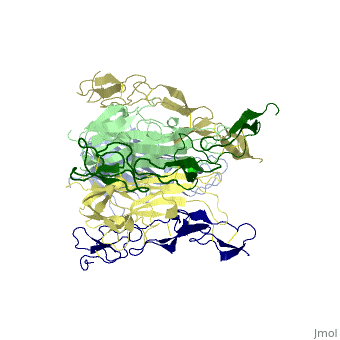1d0g
From Proteopedia
(New page: 200px<br /> <applet load="1d0g" size="450" color="white" frame="true" align="right" spinBox="true" caption="1d0g, resolution 2.4Å" /> '''CRYSTAL STRUCTURE OF...) |
|||
| Line 1: | Line 1: | ||
| - | [[Image:1d0g.gif|left|200px]]<br /> | + | [[Image:1d0g.gif|left|200px]]<br /><applet load="1d0g" size="350" color="white" frame="true" align="right" spinBox="true" |
| - | <applet load="1d0g" size=" | + | |
caption="1d0g, resolution 2.4Å" /> | caption="1d0g, resolution 2.4Å" /> | ||
'''CRYSTAL STRUCTURE OF DEATH RECEPTOR 5 (DR5) BOUND TO APO2L/TRAIL'''<br /> | '''CRYSTAL STRUCTURE OF DEATH RECEPTOR 5 (DR5) BOUND TO APO2L/TRAIL'''<br /> | ||
==Overview== | ==Overview== | ||
| - | Formation of a complex between Apo2L (also called TRAIL) and its signaling | + | Formation of a complex between Apo2L (also called TRAIL) and its signaling receptors, DR4 and DR5, triggers apoptosis by inducing the oligomerization of intracellular death domains. We report the crystal structure of the complex between Apo2L and the ectodomain of DR5. The structure shows three elongated receptors snuggled into long crevices between pairs of monomers of the homotrimeric ligand. The interface is divided into two distinct patches, one near the bottom of the complex close to the receptor cell surface and one near the top. Both patches contain residues that are critical for high-affinity binding. A comparison to the structure of the lymphotoxin-receptor complex suggests general principles of binding and specificity for ligand recognition in the TNF receptor superfamily. |
==Disease== | ==Disease== | ||
| Line 11: | Line 10: | ||
==About this Structure== | ==About this Structure== | ||
| - | 1D0G is a [http://en.wikipedia.org/wiki/Protein_complex Protein complex] structure of sequences from [http://en.wikipedia.org/wiki/Homo_sapiens Homo sapiens] with ZN and CL as [http://en.wikipedia.org/wiki/ligands ligands]. Full crystallographic information is available from [http:// | + | 1D0G is a [http://en.wikipedia.org/wiki/Protein_complex Protein complex] structure of sequences from [http://en.wikipedia.org/wiki/Homo_sapiens Homo sapiens] with <scene name='pdbligand=ZN:'>ZN</scene> and <scene name='pdbligand=CL:'>CL</scene> as [http://en.wikipedia.org/wiki/ligands ligands]. Full crystallographic information is available from [http://oca.weizmann.ac.il/oca-bin/ocashort?id=1D0G OCA]. |
==Reference== | ==Reference== | ||
| Line 18: | Line 17: | ||
[[Category: Protein complex]] | [[Category: Protein complex]] | ||
[[Category: Ashkenazi, A.]] | [[Category: Ashkenazi, A.]] | ||
| - | [[Category: Christinger, H | + | [[Category: Christinger, H W.]] |
| - | [[Category: Connell, M | + | [[Category: Connell, M P.O.]] |
[[Category: Fuh, G.]] | [[Category: Fuh, G.]] | ||
| - | [[Category: Hymowitz, S | + | [[Category: Hymowitz, S G.]] |
| - | [[Category: Kelley, R | + | [[Category: Kelley, R F.]] |
| - | [[Category: Vos, A | + | [[Category: Vos, A M.de.]] |
[[Category: CL]] | [[Category: CL]] | ||
[[Category: ZN]] | [[Category: ZN]] | ||
| Line 31: | Line 30: | ||
[[Category: tnf receptor family]] | [[Category: tnf receptor family]] | ||
| - | ''Page seeded by [http:// | + | ''Page seeded by [http://oca.weizmann.ac.il/oca OCA ] on Thu Feb 21 12:11:35 2008'' |
Revision as of 10:11, 21 February 2008
|
CRYSTAL STRUCTURE OF DEATH RECEPTOR 5 (DR5) BOUND TO APO2L/TRAIL
Contents |
Overview
Formation of a complex between Apo2L (also called TRAIL) and its signaling receptors, DR4 and DR5, triggers apoptosis by inducing the oligomerization of intracellular death domains. We report the crystal structure of the complex between Apo2L and the ectodomain of DR5. The structure shows three elongated receptors snuggled into long crevices between pairs of monomers of the homotrimeric ligand. The interface is divided into two distinct patches, one near the bottom of the complex close to the receptor cell surface and one near the top. Both patches contain residues that are critical for high-affinity binding. A comparison to the structure of the lymphotoxin-receptor complex suggests general principles of binding and specificity for ligand recognition in the TNF receptor superfamily.
Disease
Known diseases associated with this structure: Squamous cell carcinoma, head and neck OMIM:[603612]
About this Structure
1D0G is a Protein complex structure of sequences from Homo sapiens with and as ligands. Full crystallographic information is available from OCA.
Reference
Triggering cell death: the crystal structure of Apo2L/TRAIL in a complex with death receptor 5., Hymowitz SG, Christinger HW, Fuh G, Ultsch M, O'Connell M, Kelley RF, Ashkenazi A, de Vos AM, Mol Cell. 1999 Oct;4(4):563-71. PMID:10549288
Page seeded by OCA on Thu Feb 21 12:11:35 2008

